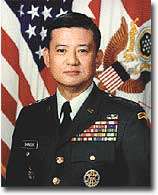The U.S. Army Chief of Staff, Kaua’i native Gen. Eric Shinseki, did everything in his power as the nation’s top Army officer to make sure Army forces in battle in the Persian Gulf region were totally prepared for nothing short of total, rapid victory.
In a speech in Dallas last week, he all but guaranteed a quick end to the conflict, during which the enemy will feel a stern wrath designed to “break their will to resist, early,” he said.
Victory in the war with Iraq will show the preparedness of Army forces, Shinseki predicted.
“They are prepared to fight and win, decisively. Our war-fighting formations will seize the initiative and strike hard at times, in places, and with methods of our own choosing,” he said.
“We will build momentum and achieve moral dominance over our enemy, and end the conflict as quickly as possible,” said Shinseki.
“This is not a battle plan. That is our doctrine; American war-fighting doctrine,” he continued.
War-fighting “must be effective and preferably overwhelming to our enemies. We intend to break their will to resist, early,” he said.
While Shinseki was not available for comment yesterday, his media advisor described some other duties and responsibilities of Shinseki as the nation engages in armed conflict.
“He is a force provider,” said Lt. Col. Michael Negard, Shinseki’s media advisor. Among Shinseki’s duties in his capacity as Army chief of staff is to provide “a trained and capable force to the combatant commanders,” including field commanders in both Kuwait and South Korea, said Negard.
Shinseki continues to fulfill responsibilities, including making sure the Army commander in Kuwait has all the personnel and equipment necessary to conduct a winning campaign, Negard said.
Shinseki’s whereabouts is a closely guarded secret, said Negard. Shinseki is the son of Fudeko Shinseki of Lihu’e, and the late Tomotsu Shinseki.
Army troops under Shinseki’s command were expected to be among the first moving from northern Kuwait into Iraq yesterday evening Hawai’i time, and as of yesterday morning were already on the move from their Kuwait assembly areas toward the Iraqi border, Negard said.
Getting time to talk to Shinseki is difficult for reporters.
“He does very few interviews when he’s here at work,” and in the six months Negard has been on the job Shinseki hasn’t conducted a single media telephone interview, Negard said.
Further Shinseki remarks from the Texas speech give some insight into how war preparations were progressing.
“Our soldiers, sailors, airmen, Marines, Coast Guardsmen, active and reserve, and our civilians who work with us, are all doing some heavy lifting in this war on terrorism,” he said. “And they are doing it superbly.
“Today’s war-fighters are our heroes in the making,” said the general, taking special effort to recognize contributions of parents and families of those who are at war today.
“We would be remiss if we did not pause to recognize our military families and their unique gifts and sacrifices. They are the most generous people I know,” he said.
“Their strength and their devotion allow war-fighters to focus on their missions, defending the freedom and privilege we all enjoy,” Shinseki continued.
“Once again, soldiers are fighting for our freedom. For the first time in 60 years, they are fighting directly on behalf of the American people. And soldiers know this,” he said.
“When you talk to them, you see it in their eyes and you hear it in their voices. And it is measured in their tenacity. They know they face a determined and deliberate enemy who struck us on 11 September 2001, attacked our homeland, killed our people, shook our confidence,” he said.
Those who lost loved ones during those attacks will forever live with the excruciating pain of those losses, “and our soldiers will never forget, either,” he continued.
Army forces continue to guard airports, government buildings, nuclear facilities, and other critical infrastructure, he added.
And continued fighting and guarding seems extremely necessary now, he said.
“In the midst of all the uncertainty that visited our nation after 11 September 2001, the strength and generosity of the American people and the courage and selflessness of young Americans who have chosen to serve in uniform, these must endure.
“The sacrifice of soldiers and other service members for this higher calling provides for the essential confidence of Americans, to get out of bed, without fear; to go to work, without fear; to put our children in school, without fear; and to travel and gather as we choose, all without fear,” he said.
Like other heroes before them, soldiers at war half a world away will fight to ensure that their children and grandchildren will “bless their name for having defended for all Americans the right to live and to die as free men and women, on our feet, not on our knees; with heads up, not bowed down in servitude.
“The sacred duty of our men and women in uniform is to guarantee for every American the right to make the same proclamation,” he said.
“God bless our men and women in uniform, and God bless America,” he concluded.
Staff Writer Paul C. Curtis can be reached at mailto:pcurtis@pulitzer.net or 245-3681 (ext. 224).





